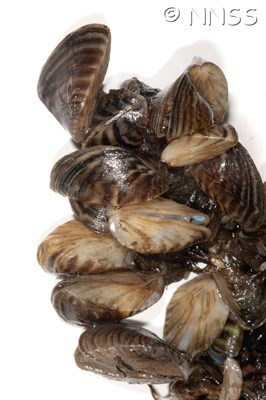A free information evening is seeking to increase public awareness about the risks
 posed by invasive non-native species in the Island’s fresh water and marine environments.
posed by invasive non-native species in the Island’s fresh water and marine environments.
The event, jointly organised by the Department of Environment, Food and Agriculture (DEFA) and the Manx Wildlife Trust, takes place on Tuesday 27 March 2018 at the Douglas Bay Yacht Club, running from 7pm – 8:15pm.
The event, titled 'Stop the aquatic hitchhikers!' is timed to coincide with the UK’s fourth annual Invasive Species Week which this year runs from 23 – 29 March.
Minister for Environment, Food and Agriculture, Geoffrey Boot MHK, said:
'It is essential that DEFA continues to work with partner agencies to raise awareness of biosecurity and promote good practice to reduce the risk of the introduction and spread of invasive non-native species.
'These organisms can destabilise the unique balance of our ecosystems and can pose a threat to our Island’s biodiversity and, ultimately, our economy. They do this by outgrowing, out-competing and killing native species.
'Education is key – the more we can get people to understand the potential risks and consequences, the better chance we have in preventing the introduction of these types of species to the Island’s waters.
'This work is aligned to the Programme for Government’s very important aim of conserving and cherishing our natural environment.'
The event is open to all, but is particularly targeted towards anglers and water sports enthusiasts.
The evening will provide information on what species to look out for and what steps to take to reduce the risk of their spread in and around the Isle of Man.
Dr Jan Gledhill, who will give a presentation at the event, said:
'Invasive species can be spread by hitchhiking on water-sports equipment, boat hulls and in ballast water. They can alter whole ecosystems, damage man-made structures and be very costly to remove.
'For example the marine carpet sea-squirt is now found in some harbours around the Irish Sea where it grows in thick carpets, killing native marine life. This has raised concerns of a possible threat to some fisheries. The sea-squirt fouls boats and harbour structures, with clean-up costs for harbours running into hundreds of thousands of pounds.
'In lakes and reservoirs the zebra mussel is a major species of concern. These can be introduced via angling or boating equipment and can quickly colonise hard surfaces. They filter large quantities of water, reducing the food available for native species and can block water pipes and water treatment works.
'Early identification and treatment is essential if invasive species do appear. Our event will give the public the information they need to help us in our work to safeguard our Island’s ecosystems.'
The Manx Wildlife Trust is publishing an updated identification guide to marine non-native invasive species, funded by the Society for the Preservation of the Manx Countryside and Environment.

